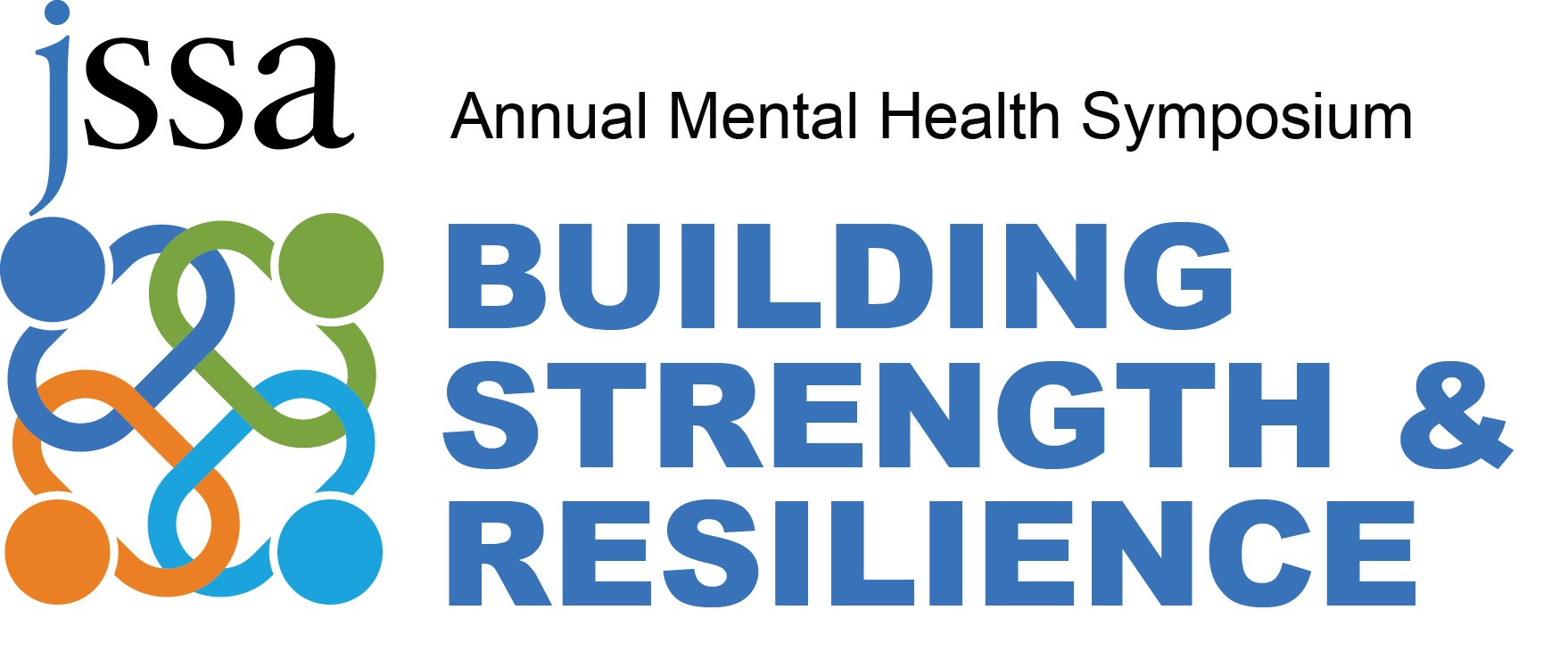JSSA’s Annual Mental Health Symposium
Date: Thursday, May 22, 2025
Time: 10:00 am – 4:15 pm
Location: Bender JCC
6125 Montrose Road, Rockville, MD 20852
5 CATEGORY I CE’S
Description:
Change is abundant in life, and resiliency is paramount with our national climate stirring uncertainty and fear. JSSA is pleased to announce our annual mental health symposium focusing on strength and resiliency. The 2025 symposium will provide you with tools and strategies to support clients as we continue to navigate uncertainty.
Workshops will provide tools and strategies for working with the school community, parents, the aging and elderly population, and families. Focusing on cultivating inner strength, developing coping mechanisms, and fostering community support, attendees will leave with practical insights to enhance mental health and thrive in the face of adversity.
Join us for a panel discussion to hear about the lived experiences of the transgender community. This session will focus on ways to foster resilience and provide effective care to transgender youth and families.
Participants will gain valuable insights into strengthening their therapeutic interventions, supporting clients through adversity, and enhancing resilience.
AGENDA
10:00 – 11:30 a.m. Welcome and Keynote
11:30 – 11:45 a.m. Break
11:45 a.m. – 1:15 p.m. Workshops
1:15 – 2:15 p.m. Lunch
2:15 – 3:15 p.m. Panel Discussion
3:30 – 4:30 p.m. Endnote
10:00 – 11:30 a.m. – KEYNOTE – MARY ALVORD (1.5 CE’S)
The Power of Connection: How Fostering Resilience Helps in Forming Meaningful Relationships
Health and well-being are greatly enhanced by the connections we make in life, and mental health professionals are uniquely positioned to equip their clients with the tools and skills required to seek out and build meaningful relationships. These tools and skills are the building blocks of resilience — the ability to adapt with mental flexibility to setbacks and challenges — and they can be taught and developed. We’ll examine such key factors as the ability to self-regulate, to nurture one’s strengths and talents, and to take advantage of community — all of which play a critical role in developing and maintaining relationships. Practical strategies that can help enhance resilience will be emphasized.
LEARNING OBJECTIVES:
Participants will be able to:
1. Describe the importance of resilience in forming and maintaining meaningful relationships.
2. Identify two key factors that contribute to resilience.
3. Apply practical strategies to foster resilience and facilitate connections.
PRESENTER BIO: Mary K. Alvord, Ph.D.
Mary K. Alvord, Ph.D., is a psychologist and founder of Alvord, Baker & Associates, LLC, with more than 40 years of clinical experience. She also founded the charity, Resilience Across Borders, Inc., and is an Adjunct Associate Professor at The George Washington School of Medicine and Health Sciences. Dr. Alvord has contributed to tip sheets written for the public by the American Psychological Association on resilience and stress and has published peer-reviewed articles and chapters on resilience and social competence. Dr. Alvord is co-author of Resilience Builder Program for Children and Adolescents: Enhancing Social Competence and Self-Regulation, Conquer Negative Thinking for Teens, and The Action Mindset Workbook for Teens: Simple CBT Skills To Help You Conquer Fear & Self-Doubt & Take Steps Toward What Really Matters.
11:45 – 1:15 p.m. – 3 WORKSHOPS (1.5CE’S)
WORKSHOP 1:
Tools and Strategies to Build Resilience in the Co-occurring Population
This training program is designed for professionals working with individuals who have a dual diagnosis, which refers to the coexistence of both mental health and substance use disorders. Participants will explore effective tools and strategies to support and build resilience in this unique population. By enhancing participants’ understanding of the challenges faced by individuals with dual diagnoses, the training will provide practical, evidence-based approaches to foster recovery, promote well-being, and encourage long-term stability.
LEARNING OBJECTIVES:
Participants will:
• Gain a comprehensive understanding of the co-occurring population and the complex interplay between mental health and substance use disorders.
• Learn strategies to assess resilience and identify strengths within the co-occurring population.
• Discover therapeutic tools and interventions to enhance emotional coping skills, self-efficacy, and recovery-oriented behaviors.
• Explore best practices for creating a supportive environment that fosters resilience
• Examine case studies and real-world scenarios to apply learned strategies in diverse settings.
PRESENTER BIO: Jason Martin, Psy.D., LCPC
Dr. Jason Martin is a licensed clinical professional counselor (LCPC) with extensive experience in providing mental health and substance use disorder treatment. He specializes in working with individuals who have co-occurring issues, combining expertise in both mental health and addiction therapy. With a deep commitment to fostering resilience and recovery, Dr. Martin utilizes a trauma-informed, client-centered approach to support individuals in overcoming challenges and building long-term emotional well-being. He is passionate about empowering clients and professionals with the tools and strategies to achieve lasting recovery. Dr. Martin currently serves as the manager for Adult, Adolescent, and Child Behavioral Health for the Montgomery County Department of Health and Human Services, overseeing all of the county’s outpatient mental health clinics.
WORKSHOP 2:
Strengthening Families by Building Resiliency
This dynamic and interactive workshop is designed for mental health professionals dedicated to supporting families and communities facing ongoing trauma. Strengthening Families and Communities by Building Resiliency will explore how therapeutic approaches—specifically play therapy, family therapy, and group therapy—can be used to foster resilience in individuals and systems affected by chronic stress and adversity.
Participants will engage with both theoretical foundations and hands-on activities to better understand how trauma affects families and communities, and how therapeutic interventions can help them heal and thrive. Through experiential exercises, group discussions, and practical tools, attendees will learn how to apply trauma-informed strategies that build emotional strength, deepen connections, and promote long-term well-being.
LEARNING OBJECTIVES:
- Gain insight into the role of play therapy, family therapy, and group therapy as a form of building resilience in systems of ongoing adversity.
- Learn and practice skills that focus on meeting clients where they are, focusing on the here and now.
- Reflect on and acquire strategies to address their reactions when working with clients who are experiencing ongoing hardship.
PRESENTERS BIO:
Alex Hammer, LCSW-C
As the Director of Clinical Operations for JSSA’s Fallsgrove location, Alex supervises the outpatient therapists on the Children and Families team. Before working at JSSA, Alex was the Director of Mental Health for Linkages to Learning at the YMCA Youth and Family Services, connecting communities with school-based behavioral health therapy. Alex also has experience as the manager of inpatient behavioral health services at Adventist Behavioral Health Hospital, working with individuals across the life span in a therapeutic inpatient setting with varying levels of acuity, with both voluntary and involuntary admissions.
Elissa Gildenhorn, LMSW, is a clinical social worker and certified yoga instructor. Elissa earned her master’s degree in social work from the University of Southern California in 2022. Elissa currently works at JSSA, where she provides individual, family, and group therapy to a diverse client population. Elissa integrates techniques from various therapeutic modalities, including cognitive-behavioral therapy, child-centered play therapy, person-centered therapy, and motivational interviewing, to empower her clients to reach their therapeutic goals.
WORKSHOP 3:
Aging and Resiliency
Join us for a thought-provoking workshop on Aging and Resilience, where we will explore the unique mental health challenges and opportunities that arise as individuals age. This session will focus on strategies to build emotional resilience in older adults, helping them navigate changes in health, identity, and life circumstances. Participants will learn how to support aging individuals in maintaining a positive mindset, managing stress, and adapting to life’s transitions, fostering a sense of purpose and well-being throughout the aging process.”
LEARNING OBJECTIVES:
• Understand age-related challenges: Gain insights into the specific mental health challenges older adults face and how these can impact resilience and well-being.
• Explore resilience-building strategies: Learn practical techniques to help older adults cultivate emotional resilience, manage stress, and adapt to life transitions with confidence.
• Promote positive aging: Discover ways to support older adults in maintaining a sense of purpose, connection, and mental well-being, enhancing their quality of life as they age.
PRESENTERS: Rene Laje, Koretta Skeleton, Melissa Gatlin
Rene Laje, PhD, LCSW-C, LICSW, is the Director of Clinical Operations in Mental Health for the Adults and Seniors Team and has been with JSSA for over 8 years. She supervises a team of 18 therapists and is responsible for identifying community-based mental health needs, as well as providing daily direction and supervision to clinicians who work with adults and seniors. In addition, she coordinates with community providers to identify and develop mental health resources and products that enhance the lives of the individuals being served.
Dr. Laje is a Medicare provider and has a private practice where she has provided individual and couples therapy for nearly 20 years. She obtained her PhD in Social Work from Fordham University with a specialization in Gerontology. Her specialties include caregiving, aging-in-place and managing mental health issues.
Koretta Skelton, LCSW-C, ACHP-SW, is a dedicated Licensed Clinical Social Worker with over 20 years of experience in therapy counseling, supervision, hospice care, child welfare, and school-based therapy. Koretta holds a Bachelor of Science in Social Work degree from Morgan State University (2002) and a Master of Social Work degree from Barry University (2003). She is an advocate for the well-being of individuals, families, and colleagues. She empowers and supports individuals as they cope with life changes through therapeutic insight and perspectives regarding trauma, sudden loss, anticipatory grief, end-of-life preparation, and processing difficult life circumstances.
Melissa Gatlin, LCSW-C, has been a social worker in Maryland for over 30 years. Her career began in child protective services, followed by providing safety assessments and support services to older and vulnerable individuals. While working for the Lourie Center for Infants and Young Children, Linkages to Learning, and in Montgomery County Public Schools, she often supported caretakers and children through attachment therapy. In private practice, she worked with people of all ages and enjoyed serving neurodiverse populations and their families. Melissa has been working primarily with adults and older adults at JSSA for the last 9 years.
1:15 – 2:00 p.m. LUNCH
2:15 – 3:15 p.m. – PANEL Discussion
Building Strength and Resiliency in the Trans Community – learning from lived experiences
Join us for an impactful panel discussion featuring transgender individuals who will share their personal journeys of resilience and strength. In this session, panelists will discuss the challenges they have faced, the strategies they used to build emotional and mental resilience, and the importance of community support. Attendees will gain valuable insights into the unique experiences of transgender people and learn effective tools and practices to foster resilience, both in their personal lives and in their therapeutic work with diverse communities.”
LEARNING OBJECTIVES:
• Understand the unique challenges: Gain a deeper understanding of the emotional and mental challenges faced by transgender individuals and how these challenges can impact resilience.
• Explore strategies for building resilience: Learn practical and effective strategies that transgender individuals use to cultivate strength, self-empowerment, and emotional well-being in the face of adversity.
• Promote inclusivity and support: Identify ways to create a supportive and inclusive environment for transgender clients, fostering resilience through affirmation, validation, and community-building.
PANEL MEMBERS: Matty Stewart-Boldin, Youth Coordinator, JSSA, and Audrey Lyon and Jeff Weintraub – parents of a Transperson, and Cari A. Guthrie, CEO of Cornerstone Montgomery.
3:30 – 4:30 p.m. – END NOTE –(1CE)
Remaining Strong and Resilient
As we conclude today’s symposium, let us carry forward the powerful messages of strength, resiliency, and hope that we’ve explored. We’ve heard stories of overcoming adversity, discovered tools for building mental resilience, and reaffirmed the importance of community support in our mental health journeys.
Remember, strength isn’t about being invincible but about having the courage to keep going even when the road is tough. Resiliency is not a trait we’re born with but a skill we develop over time through compassion, perseverance, and self-care.
As we leave here today, let us be inspired by the individuals who’ve shared their experiences and the knowledge we’ve gained. May we apply what we’ve learned, not just in our own lives, but in how we support and uplift others. The work we do to strengthen our mental health and resilience creates a ripple effect that can transform communities, workplaces, and families.
LEARNING OBJECTIVES:
Participants will:
•Identify two strategies for self-reliance and remaining resilient
•Share different tools and techniques collectively to equip ourselves, and we can use to remain hopeful while supporting their clients•
•Learn to identify and acknowledge their own strengths, fostering self-awareness and empowering individuals to use these strengths in challenging situations.
•Receive and provide actionable tools and strategies to enhance personal coping mechanisms for managing mental health struggles
•Walk away better equipped to integrate the tools and insights gained throughout the event into their daily lives, enhancing their emotional well-being and capacity to navigate adversity.
PRESENTER BIO: Uma S. Ahluwalia
Uma S. Ahluwalia is a respected social services and public health services professional with extensive experience leading key growth initiatives in demanding political and legislative environments. She is an expert in delivering innovative, reliable, cost-effective solutions and public policy strategies that improve operations and productivity.
Before joining HMA, she had a 22-year public sector career in state and local government. For twelve years, she served as director of the Montgomery County Department of Health and Human Services in Maryland, where she led implementation of the Affordable Care Act, oversaw the move to a more integrated and interoperable health and human services enterprise, and managed public-private partnerships and programs.
Uma’s work experience also includes executive leadership in child welfare, as the interim director of the Child and Family Services Agency in Washington, DC, and assistant secretary of the Department of Social and Health Services in the State of Washington for the Children’s Administration.
Her HMA consulting practice spanning across states and counties around social services, public health, and behavioral health has further refined her approach to integrating social services with public health and behavioral health to improve outcomes across the lifespan and reduce disparities based on differences across socio-economic conditions.




